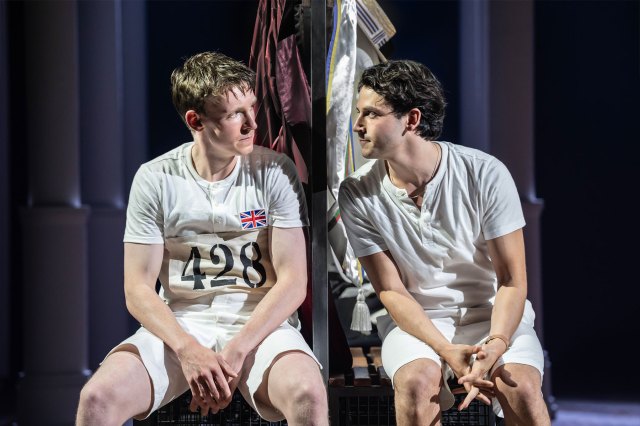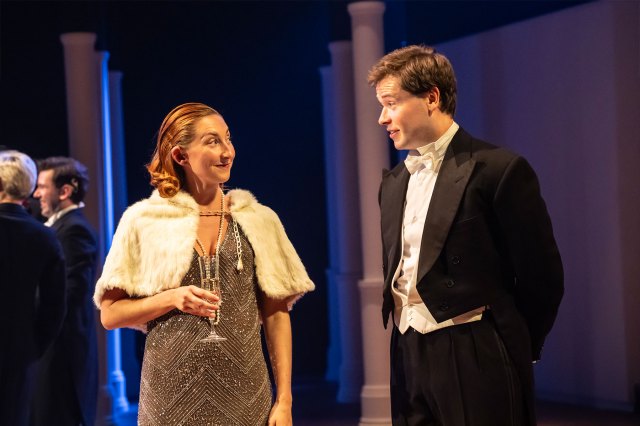Chariots of Fire at the Crucible Theatre – review
Robert Hastie’s final production as the venue’s artistic director runs until 27 July

Robert Hastie, in his final production as artistic director, shows his customary mastery in deploying a huge cast on the vast thrust stage of the Crucible. This time there are 16 professionals and a similar number from Sheffield People’s Theatre. At its height, early in the second half, we have a full balcony of a dozen or so dignitaries presiding over an Olympic opening ceremony that fills the space.
Ben Stones’ designs equip the stage as a gym at the start, with treadmills, a vaulting horse and so on. Hastie populates it with actors (a pretty athletic lot) working out under the heading “PARIS 2024”, then takes us back through Olympiads to 1924 by which time the gymnasts have been replaced by chaps in short-sleeved vests and long shorts. The inconspicuous changing of the furniture, plus imaginative use of a revolve, characterises the whole production.
I am less convinced by the costumes: 1920s-style athletic gear with some garment to suggest the character. In the second half, we settle into full costumes until the final, unexpectedly moving scene when we’re back to vest and shorts for all, singing “Jerusalem” and recounting the later life of the characters: we know about the heroic tragedy of Eric Liddell’s life, but its impact is undiminished.
For anyone unfamiliar with Colin Welland’s screenplay for the film, adapted for the stage in 2012 by Mike Bartlett, it focuses on the rivalry between Liddell and Harold Abrahams and the Paris Olympics a century ago. It cleverly reveals both men as outsiders: Abrahams a Jew who in his burning ambition rejects the amateurism of his day and employs a professional coach (persona non grata at the Games), Liddell the evangelical Christian born in China to missionaries who refuses to run in the 100 metres on a Sunday and instead runs in the 400 metres – and wins!

Welland and Bartlett ask us to believe that Liddell’s crisis of confidence arrives at the last minute and necessitates high-level meetings with the Prince of Wales, but it makes for a more dramatic reading than the true story that he knew well in advance and trained for the 400. The play at least doesn’t shy away from the issues – anti-semitism and the nature of the pursuit of glory, in particular – and briefly, without melodrama tells of Liddell’s return to China as a missionary and ultimate death in a Japanese prison camp.
The opening section contains plenty of highlights, notably the spectacular re-creation of Abrahams’ attempt at the Great Court Run at Trinity College, but the need to cover a lot of ground quickly leads to a caricature element. However, things tighten up when Abrahams, having lost a race to Liddell, is approached by Sam Mussabini, wishing to act as his coach.
Adam Bregman and Michael Wallace play Abrahams and Liddell with exemplary restraint, but absolute conviction, each digging his heels in when faced with a challenge to his principles. Tom Glenister and Benjamin Westerby as Abrahams’ friends Montague and Lindsay register strongly, Westerby doing a very nifty hurdles clearance, and Richard Cant and Mark Lockyer are the older generation college masters and lords, who make their mark as subtle and blustering, respectively. Leo Wan’s Prince of Wales is done with great wit, and Waleed Elgadi brings a quiet, but definite, purposefulness to Sam Mussabini.
It was a man’s world in 1924 but Chanel Waddock and Lois Pearson, as the women (girlfriend, later wife, and sister) in Liddell’s life and Bessy Ewa as a lead singer with the D’Oyly Carte whom Abrahams becomes involved with, both create vivid characters. The bits of Gilbert and Sullivan linking scenes are fun and Vangelis’ famous theme has to wait till the end to make its impact.
















